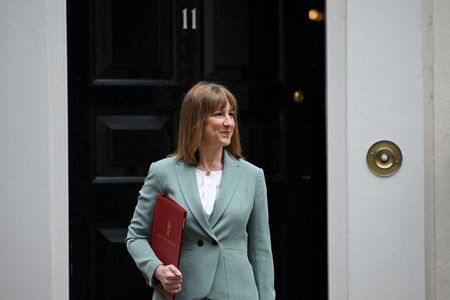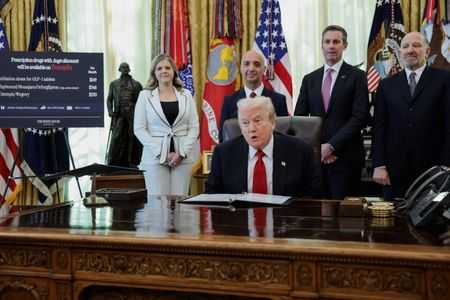LONDON (Reuters) -British finance minister Rachel Reeves has told the country’s budget watchdog that a rise in personal taxation is among the “major measures” she is preparing to announce in her budget, The Times reported on Thursday, confirming previous reports.
Reeves is expected to raise tens of billions of pounds in taxes in her November 26 budget to stay on track for her fiscal targets, a key issue for bond investors.
While Reeves could still change course, its inclusion in the government’s official submission to the Office for Budget Responsibility indicates the proposal is under serious consideration, The Times said.
A spokesperson for Reeves’ office said she had set out “the context for the budget, recognising global and long-term economic challenges.”
“It will continue to build the strong foundations to secure Britain’s future and on the priorities of the British people – cutting waiting lists, cutting national debt and cutting the cost of living,” the spokesperson added.
The Times report said Reeves was considering a two-pence increase in income tax alongside a two-pence cut to National Insurance contributions in a move aimed at shifting the tax burden away from workers and towards groups such as pensioners and landlords.
It also said Reeves was weighing a cap on the National Insurance cut, limiting it to earnings below 50,270 pounds. Economists estimate the change could raise more than 6 billion pounds ($8 billion) annually.
Under the plan, the rate would fall from 8% to 6% for lower earners, while income above that threshold would continue to be taxed at 2%, The Times said.
On Tuesday, Reeves said that “each of us must do our bit,” raising expectations of a break from Labour’s election pledge not to raise major taxes.
She signalled then that she would pursue broad tax rises to avoid a return to austerity and maintain public spending, citing high debt levels, weak productivity and persistent inflation.
The National Institute of Economic and Social Research, a think tank, has urged Reeves to come up with 50 billion pounds’ worth of measures.
($1 = 0.7451 pounds)
(Reporting by Sam Tabahriti; Editing by Cynthia Osterman and Rosalba O’Brien)










